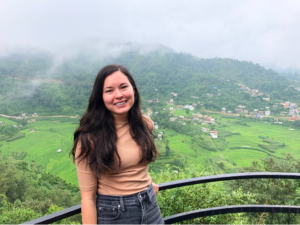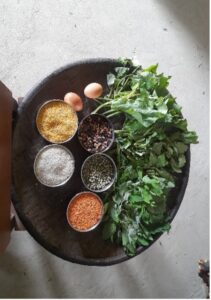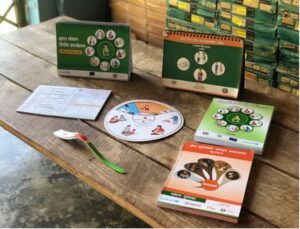
Hello again, this is Ellina Wood. As the summer is quickly fading and my internship is coming to an end, I have been reflecting on my time spent in Nepal over the past three months. I have the great fortune to complete an incredibly fulfilling and rewarding dietetic internship with Helen Keller International (HKI) on Suaahara II: a project that has been implemented in Nepal since 2016 and partners with local stakeholders to address the health and nutritional status of women and children across 42 key districts.

I agreed to the internship with the premise that I would engage in cooking demonstrations, analyze the nutrition content of existing recipes, make recipe recommendations to bolster the micronutrient profile, and write success stories to be shared in the annual report. Although some of my time has been spent on these objectives, a larger aspect of my internship has been spent on other tasks. While collaborating with a local dietitian and the Ministry of Health and Population (MoHP), I conducted literature reviews to develop a new national nutritional management protocol to aid in the recovery of moderate acute malnourished (MAM) children using nutrient-dense foods in place of imported formulated supplementary foods. Whilst there is currently no international guidance that endorses the use of local foods for the treatment of MAM, emerging evidence suggests that providing local foods may be comparable to formulated supplementary foods for recovery rate and weight gain so long as quality sources are used for the appropriate duration. In fact, the World Health Organization (WHO) is in the process of developing an international guideline, focusing on locally available food, for the prevention and treatment of moderate wasting in children presenting at health facilities with acute illness. It is the MoHP’s goal that any learning generated through monitoring and evaluation of the rollout of the new nutritional management protocol will be a valuable addition to the evidence base for the WHO guidelines.

I also provided technical support to my team as they conducted pilot testing for an upcoming revision to Nepal’s Growth Monitoring and Promotion (GMP) guideline. The field-testing process meant that I had the opportunity to travel to different regions across Nepal to meet with the municipality-level governments and to support my team in training/ observing health care providers at Outpatient Therapeutic Centres (OTCs) and Non-Outpatient Therapeutic Centres (non-OTCs). Following each GMP pilot test, my team conducted exit interviews and focus groups with participating health care workers and mothers. Our observations and the following discussions ultimately guided our revisions for the GMP protocol and model recommendations for local and national government-decision making. Being able to travel to several districts not only gave me the chance to engage in monitoring and evaluation exercises with various government agencies and communities but it also allowed me to gain a deeper understanding of the region-specific customs and beliefs (trying new foods and getting glimpses of new, breathtaking views was a bonus!). I gained knowledge about the value of adaptability, how to effectively communicate in a culture that differs from my own, and how to be receptive when my worldview is challenged.
Although it is difficult to leave, I do so knowing that I am far better equipped to handle public health challenges. Overall, my internship has left me feeling inspired to continue working in the global health space.
-Ellina
